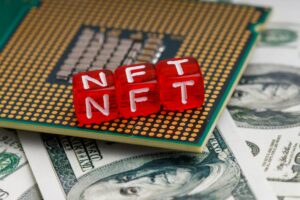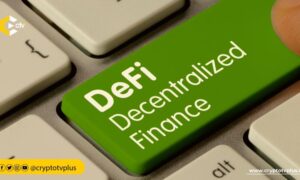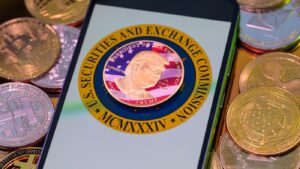NFT Firsts: SEC Settles First Two NFT Securities Cases – Securities

To print this article, all you need is to be registered or login on Mondaq.com.
For the past two years, the SEC has become increasingly more
hostile towards blockchain service providers and issuers, which has
manifested in a deluge of enforcement actions against exchanges,
decentralized finance (DeFi) protocols and token issuers. During
that time, however, they had not issued any specific guidance or
taken any public action against non-fungible token (NFT) issuers.
That is, until now.
Impact Theory
On August 28, the SEC charged Impact Theory, LLC, a Los Angeles
based media and entertainment company, with offering unregistered
securities.i According to its order, the SEC had alleged
that Impact Theory, through the sale of its Founder’s
Keys NFTs, had generated approximately $30 million in
sales proceeds from hundreds of investors across the United
States.ii As with most of its enforcement actions
against cryptocurrency companies, the SEC sought to apply the
Howey Test which sets forth the test for whether an asset
was sold as part of a securities transaction. Howey tests
whether the underlying transaction constitutes an “investment
contract.” To qualify a security under this test, an offering
(here, the sale of the NFTs) must involve (i) an investment of
money, (ii) in a common enterprise, (iii) with a reasonable
expectation of profit, (iv) which profit is derived from the
efforts of others.”
In support of its action, the SEC’s settlement set forth the
facts applicable to the finding that Impact Theory sold NFTs as
part of a securities offering, including that Impact Theory made
numerous communications to its investors starting that proceeds
from NFT sales would be used for “development,”
“bringing on more team,” and “creating more
projects.”iii The company also communicated a
vision of “trying to build the next Disney,” and made
similar statements at live events, on social media, and on its
website.iv Specifically, the SEC grouped Impact
Theory’s communications into four categories:
Impact Theory invited potential investors to view the purchase
of a Founder’s Key as an investment into the business and, if
it were successful, it would deliver “tremendous value”
to purchasers.”v
Impact Theory claimed this “purported value would be
derived from the company’s efforts” and proceeds from NFT
sales would be used for “development,” “bringing on
more team,” and “creating more
projects.”vi
Impact Theory claimed the fortunes of NFT purchasers, Impact
Theory, and Impact Theory’s founders “were all linked
together.”vii
In response to these statements, various prospective and actual
purchasers made statements reflecting they have been moved by or
adopted Impact Theory’s views on the investing opportunity NFTs
represent.viii
Impact Theory: SEC Order and Accompanying Statement
As part of the settlement with the SEC, Impact Theory agreed to
certain remedies. Impact Theory was ordered to (1) destroy all
remaining KeyNFTs in its control, (2) publish notice of the
SEC’s order and settlement to its website and social media, (3)
revise the smart contract(s) or any other code of any remaining
KeyNFTs to eliminate the 10 precent resale royalty collected by
Impact Theory, (4) pay approximately $6.1 million in disgorgement
of its profits, and (5) assist with the development and
administration of a distribution plan.ix
Impact Theory also offered a repurchase program—where they
offered to buy back KeyNFTs purchased in the Offering or on the
secondary market.x These repurchases resulted in Impact
Theory repurchasing 2,936 KeyNFTs, resulting in roughly $7.7
million worth of ETH at the time of purchase being returned to NFT
owners.xi
Impact Theory: Commissioners Peirce and Uyeda
Dissent
SEC Commissioners Peirce and Uyeda published a dissenting opinion to the SEC’s
action against Impact Theory where they took issue with the
Commission’s application of the Howey Test, questioned
whether enforcement was warranted (even if KeyNFTs were offered as
securities), and raised several additional questions applicable to
NFTs.xii
In the opinion of Commissioners Pierce and Uyeda, Howey
was misapplied because “the NFTs were not shares of a company
and did not generate any type of dividend for the
purchasers.”xiii While they conceded a
“legitimate concern” over “the type of hype that
entices people to spend almost $30 million for NFTs seemingly
without having a clear idea about how they will use, enjoy, or
profit from them,” that alone was not a “sufficient
basis” for the Commission to step in with
enforcement.xiv They go on to liken KeyNFTs to
“watches, paintings, or collectables” that are coupled
with “vague promises to build the brand and thus increase the
resale value of those tangible items.”xv
The dissent also argues that even if KeyNFTs did meet the
Howey Test requirements, an enforcement action was still
unnecessary. They argue “the typical cure for a registration
violation is a recission offer, which the company already made in
the form of repurchase programs.”xvi During these
repurchase programs, purchasers could have sold their NFT back to
Impact Theory and gotten their money back—similar to how a
distribution plan would remediate the same
issue.xvii
Lastly, the Commissioners highlighted several open-ended
questions to “help the Commission to approach [NFTs]
sensibly.”xviii These questions include: (1)
concerns over classification of various types of NFTs, (2) if the
Commission were to create guidance for NFT creators, what questions
would be best to address, (3) how should recent legislative efforts
regarding cryptocurrency inform their decision on any guidance
rendered, (4) whether a securities law regime is the best way to
regulate NFTs, (5) if a securities law regime is best, what
registration requirements and would best fit a unique asset like
NFTs, (6) whether this action reflects the general view of the
Commission, (7) whether any restrictions should apply to the
secondary market, (8) whether precedent developed with NFTs in mind
should apply to other unique pieces of digital art or music, and
(9) what a precedent of revising smart contract or other code may
be set for the future.xix
Stoner Cats’ Business and Activity
On September 13, 2023, the SEC brought its second enforcement
action and announced a settlement, against the Stoner Cats NFT
project.xx The background is as follows: on July 27,
2021, Stoner Cats 2, LLC (“SC2”) allegedly offered and
sold 10,320 NFTs known as Stoner Cats (“Stoner Cat
NFTs”), selling out in 35 minutes and generating approximately
$8.2 million in sales.xxi Stoner Cat NFTs were sold for
about $800 per NFT (or 0.35 ETH).xxii These NFTs were
allegedly offered and sold to finance the production of an animated
television show (“Stoner Cats is a story of a woman who uses
medical marijuana to alleviate her early Alzheimer’s symptoms
and her beautiful family of cats who will do literally anything to
save her”), which featured a cast of Ashton Kutcher, Chris
Rock, Seth MacFarlane and Vitalik Buterin.xxiii Similar
to the KeyNFTs, SC2 had enabled a 2.5 percent resale royalty to be
collected by SC2 on future secondary sales—allowing SC2 to
capitalize on an additional $20 million spent by consumers (in
approximately 10,475 secondary market
transactions).xxiv
Before and after offering these NFTs for sale, SC2 engaged in a
media campaign to promote Stoner Cat NFTs over their website and on
social media, including podcasts, YouTube, X/Twitter, Instagram and
Discord in addition to interviews aired on network and cable
television.xxv Similar to Impact Theory, the Commission
largely pointed to this media campaign in its evaluation its
Howey Test analysis and its determination that the Stoner
Cat NFTs were offered as part of an unregistered securities
offering.
SC2: SEC Order and Accompanying Statement
The Commission focused on SC2’s advertising of
“benefits of owning the Stoner Cats NFT,” including
“(a) exclusive access to Stoner Cats content, along with
additional access to any other content that the Stoner Cats
producers created ‘in perpetuity’; (b) exclusive access to
the Stoner Cats community on Discord, which included events,
contests, and opportunities to engage with the creators of the
animated show; and (c) the option for holders to resell their NFTs
on the secondary market.”xxvi
Additionally, the Commission focused on SC2’s emphasis that
it had the right team to execute their vision.xxvii The
media campaign highlighted the special skills and experiences of
the SC2 team in an attempt to convince investors that the show and
NFTs would be successful.xxviii In particular, the media
campaign emphasized the Hollywood expertise of the team as well as
their reputations as “animators, writers, and editors, whose
credits included highly-regarded animated
films.”xxix On top of this, the campaign publicized
significant experience and understanding of crypto projects,
especially NFTs.xxx
Lastly, the Commission cited numerous tweets from the SC2
X/Twitter account including the following:
@StonerCatsTV tweeted on September 7, 2021 a meme suggesting
that the smartest thing to do during a dip in the crypto markets
would be to “Buy more ETH & sweep the Stoner Cats
floor.”xxxi
@StonerCatsTV tweeted on August 9, 2021 to highlight four
recent sales of NFTs, priced in ETH a the equivalent of $137,493,
$124,994, $31,134, and $17,123.xxxii
@StonerCatsTV tweeted on August 9, 2021 the statement:
“3376 unique holders” along with the then-current floor
price (0.5 ETH) and the volume traded
(“3.7k”).xxxiii
Similar to Impact Theory, this media campaign led to the SEC
taking the position that SC2 violated the Securities
Act.xxxiv As a result, and as part of the settlement,
SC2 was ordered to (1) destroy all remaining Stoner Cat NFTs in its
control, (2) publish notice of this order to its website and social
media, (3) assist with the development and administration of a
distribution plan, and (4) pay a civil money penalty of $1,000,000
to the SEC.xxxv
SC2: Commissioners Peirce and Uyeda
Dissent
Commissioners Peirce and Uyeda once again objected to the
Commission’s application of the Howey Test, as it
“lacks any meaningful limiting
principle.”xxxvi They suggest that “[r]ather
than arbitrarily bringing enforcement actions against NFT projects,
[they] ought to lay out some clear guidelines for artists and other
creators who want to experiment with NFTs as a way to support their
creative efforts and build their fan
communities.”xxxvii They go on to say, “[t]he
fact that money is involved does not transform NFTs into
securities.”xxxviii
The Commissioners note that the allegedly offending action
constitutes “fan crowdfunding—a common phenomenon in the
world of artists, creators, and entertainers.”xxxix
They then liken Stoner Cat NFTs to Star Wars collectibles sold in
the 1970s.xl They argue:
“On the heels of the very successful release of Star
Wars in 1977, fan excitement was high.[8] To the delight of millions of
children that holiday season, the toy company Kenner sold
“Early Bird Certificate Packages,”[9] redeemable for future Luke
Skywalker, Princess Leia, and R2-D2 action figures and membership
in the Star Wars fan club. The sales of these certificates helped
to build a die-hard community of Star Wars fans. Would those I.O.U.
certificates, which could be re-sold, constitute investment
contracts? Using the analysis of today’s enforcement action,
the SEC should have parachuted in to save those kids from Star Wars
mania.”xli
While the Commissioners do not agree that Stoner Cat NFTs are
securities, they acknowledge that “NFT creators, along with
other artists, do not get a free pass from the securities
laws.”xlii Commissioners Peirce and Uyeda recommend
that “the Commission must take care to preserve the ability of
artists to sell their work, build a fan base, and involve that fan
base in future creative endeavors.”xliii In their
view, the Commission’s action “discourages content
creators from exploring ways to harness social networks to create
and distribute content” and “contributes to the legal
ambiguity facing artists, writers, musicians, filmmakers, and
others seeking to build a loyal, engaged
following.”xliv
The Future of Impact Theory and Stoner Cats
For Impact Theory, their founder Tom Bilyeu has stated in a
X/Twitter post that they will “operate [their] go-forward
business consistent with [their] good faith best understanding of
all applicable laws, rules, and regulations, will make clear that
all applicable laws, rules, and regulations, will make clear that
all of Impact Theory’s digital assets are collectibles with
utility within the exciting new landscape of Borderless
Entertainment, and will fiercely discourage people from treating
[their] digital assets as anything other than what they
are—collectables with utility”.xlv Thus, the
settlement seemingly allows the company to continue conducting
their business.
In the SC2 case, the Commission did not have a repurchase
program to evaluate as a possible mitigating factor to disgorgement
or further penalty. Here, the Commission required only that SC2 pay
a $1,000,000 civil penalty with no disgorgement. Again, the Company
is seemingly allowed to continue doing business (although
hasn’t posted on X/Twitter since the announcement of the
settlement).
Our View
These two cases are likely illustrative of the SEC’s
position when it comes to NFTs. Although both Impact Theory and
Stoner Cats sold NFTs in 2021, the SEC issued no guidance specific
to NFTs. Artists and creatives would love the opportunity to use
NFTs and blockchain technology to find creative ways to crowdfund
from their fans, and find creative ways to deliver art in return.
However, the SEC’s lack of guidance and regulation by
enforcement fails to provide concrete guidance for these creators
desperate for such guidance. These points are all reiterated by
Commissioner Pierce and Uyeda’s dissenting opinions, which ask
valid questions to which the SEC as a whole has provided no
answers.
Why these two projects? A lot of other NFT projects likely made
similar statements at the same time, including larger and better
funded companies. One view is that these companies were easy
targets; they were notable, but not big enough to fight back,
generating a quick and easy public relations win for the SEC, and
precedent to point to in future enforcement actions. Another is
that other enforcement actions remain planned or in motion, but for
various reasons have not yet been brought or announced.
Ultimately, we agree with dissenting commissioners. Even if the
SEC is fundamentally correct, that the offerings by these two NFT
companies violated the securities law, the SEC’s approach has
only left more uncertainty in its wake and giving entrepreneurs
pause when they decide to do business in the U.S. Ultimately, these
settlements are not binding on courts, and do not generate material
or specific guidance that other companies in the nascent NFT
industry can use as practical guidance.
In response to this, individuals or companies offering NFTs may
be more cautious in the marketing and promotion of their projects.
More NFT companies will consider forming outside of the U.S. or
geo-screening out U.S. participants. This result only harms
creators and fans in the U.S. that will miss out on these offerings
and innovations, and ultimately harms creators in the U.S. that are
looking for viable ways to fundraise to share and spread their art,
and make a few dollars from their biggest fans. The SEC ought to
rethink its approach, provide more practical guidance, or at
minimum, begin answering some of the questions raised by the
dissenting commissioners, otherwise the U.S. will only continue to
fall further behind other countries that are approaching this
burgeoning industry with a more forward-thinking approach.
***
We’d like to thank Joseph Bizub (FRB Fall Intern, JD
Candidate at Brooklyn Law School) for their contribution to this
article.
Footnotes
i. Impact Theory, LLC, Release No.
33-11226 (Aug. 28, 2023) at 1.
ii. Id. at 2.
iii. Id.
iv. Id. at 2-5.
v. Id.at 3.
vi. Id.
vii. Id. at 4.
viii. Id.
ix. Id. at 7.
x. Id. at 6.
xi. Id.
xii. NFTs & the SEC: Statement on
Impact Theory, LLC, Hester M. Peirce and Mark T. Uyeda, (Aug.
28, 2023).
xiii. Id.
xiv. Id.
xv. Id.
xvi. Id.
xvii. Id.
xviii. Id.
xix. Id.
xx. Stoner Cats 2, LLC, Release No. 11233
(Sep. 13, 2023) at 1.
xxi. Id. at 2.
xxii. Id.
xxiii. Id. at 3.
xxiv. Id. at 6.
xxv. Id. at 4-6.
xxvi. Id.
xxvii. Id. at 5.
xxviii. Id.
xxix. Id.
xxx. Id.
xxxi. Id. at 5-6.
xxxii. Id. at 6.
xxxiii. Id.
xxxiv. Id. at 6-7.
xxxv. Id.
xxxvi. Collecting Enforcement
Actions: Statement on Stoner Cats 2, LLC, Hester M. Peirce and
Mark T. Uyeda (Sep. 13, 2023).
xxxvii. Id.
xxxviii. Id.
xxxix. Id.
xl. Id.
xli. Id.
xlii. Id.
xliii. Id.
xliv. Id.
xlv. Tom Bilyeu (@TomBilyeu), X (Aug. 28,
2023, 12:40 PM), Tom Bilyeu on X: “Will be live in Discord
later to answer questions. @impact_theory is pleased to announce
that we have reached a settlement with the U.S. Securities and
Exchange Commission in which we resolved the SEC’s
investigation. We are happy to have concluded the SEC’s
investigation, so…” / X (twitter.com).
The content of this article is intended to provide a general
guide to the subject matter. Specialist advice should be sought
about your specific circumstances.
Source link
#NFT #Firsts #SEC #Settles #NFT #Securities #Cases #Securities




